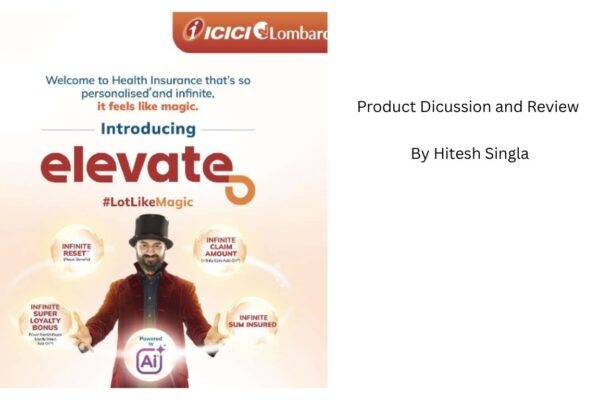Corporate vs. Personal Health Insurance: Which Is Better for You?
In today’s world, health insurance is not a luxury—it’s a necessity. With medical inflation, which as per Mr CEO of Medi Assist, a leading TPA , Mr. Satish Gidugu, is currently estimated at around 12-14% annually, Read report here (https://www.theweek.in/news/health/2025/06/22/medical-inflation-in-india-is-outpacing-general-inflation-by-a-considerable-margin.html). having a safety net is crucial to protect your savings from unexpected medical emergencies. A lot of my readers who are salaried , have corporate provided plans and hence think they are protected enough. But is that enough?
This question leads to a common dilemma: should you rely solely on your company’s plan, or is a personal health insurance policy a wiser choice? Let’s break down the pros and cons of each to help you decide.
Understanding the Two Types
Corporate Health Insurance (Group Plan):
This is a group policy that an employer provides to its employees. It often covers the employee, and sometimes their family, parents , in-laws etc, with premiums typically paid fully or partially by the company.
Personal Health Insurance:
This is a policy you purchase for yourself and your family. You are the policyholder, and you are responsible for paying the premiums and managing the policy.
The Case for Corporate Health Insurance: The Free Lunch?
Corporate health insurance comes with several attractive benefits, making it an easy choice for many.
- Cost-Effective: The biggest advantage is that the premium is usually paid by your employer. This is a significant financial benefit, as you get coverage without the direct burden of monthly premiums.
- No Waiting Periods: Many corporate plans offer immediate coverage from day one, often bypassing the waiting periods for pre-existing conditions that are common in personal policies.
- No Medical Check-ups: You are typically not required to undergo a medical check-up to enroll, which is a major relief for individuals with pre-existing health issues.
- Basic Coverage for All: The policy is standardized, ensuring that all employees have a basic level of financial protection against medical costs.
The Hidden Catches of Corporate Coverage
While convenient, relying solely on your corporate plan can leave you vulnerable.
- Job-Dependent Coverage: The most significant drawback is that your coverage is tied to your employment. If you leave your job, retire, or are laid off, your insurance ends, leaving you and your family exposed.
- Limited Customization: Corporate plans are “one size fits all.” You have very little say in the sum insured, features, and add-ons. The coverage may not be adequate for major illnesses or high-end treatments, especially in a city with high healthcare costs.
- No-Claim Bonus (NCB) Loss: Unlike personal policies, corporate plans do not offer a No-Claim Bonus (NCB), which is a discount on your premium for every claim-free year. This is a benefit you lose out on.
The Strength of a Personal Health Insurance Policy
A personal policy puts you in the driver’s seat and provides long-term security.
- Total Control and Customization: You can choose a plan that fits your unique health needs and budget. You can select a higher sum insured, add critical illness riders, and include your parents and other dependents.
- Portability and Continuity: Your personal policy is not tied to your job. You can take it with you when you switch employers, ensuring continuous coverage throughout your life, including after retirement.
- No-Claim Bonus (NCB): Personal policies reward you for staying healthy with a no-claim bonus, which can significantly reduce your premium over time.
- Tax Benefits: Premiums paid for a personal health insurance policy are eligible for a tax deduction under Section 80D of the Income Tax Act.
The Downsides of a Personal Policy
Of course, personal insurance isn’t without its challenges.
- Higher Cost: You are responsible for the entire premium, which can be a significant expense, especially for a comprehensive plan.
- Waiting Periods: Most personal policies have waiting periods for specific illnesses and pre-existing conditions, which can range from a few months to several years.
- Medical Check-up: You may need to undergo a pre-medical check-up, and the premium can be higher based on your health history.
| Product | Corporate Health Insurance (Group Plan) | Personal Health Insurance (Individual/Family Floater) |
| Premiums | Usually paid by the employer (fully or partially). | Paid entirely by the policyholder. |
| Cost | Generally more affordable for the employee. | Can be more expensive, as the premium is based on your individual health and age. |
| Customization | Very limited. The coverage and sum insured are standardized for the entire group by the employer. | Highly customizable. You can choose the sum insured, add-ons (like maternity, critical illness cover), and other features as per your needs. |
| Coverage | Often basic and may have sub-limits on room rent or specific treatments. | Can be comprehensive, with higher sum insured and fewer sub-limits, offering better protection against major illnesses. |
| Waiting Periods | Usually waived off, and pre-existing diseases are covered from day one. | Has mandatory waiting periods (e.g., 30 days for new diseases, 2-4 years for pre-existing conditions). |
| Portability | Not portable. The policy terminates the moment you leave the company. | Fully portable. You can transfer the policy to a new insurer while retaining your benefits, such as the No-Claim Bonus and waiting period credits. |
| No-Claim Bonus (NCB) | Not applicable. There is no benefit for not making a claim. | A key feature. Your sum insured increases or the premium decreases for every claim-free year. |
| Medical Check-up | Typically not required for enrollment. | May be required, especially for individuals over a certain age or with pre-existing conditions. |
| Family Coverage | May or may not include family members (spouse, children, parents). The extent of coverage is at the employer’s discretion. | You can choose to cover yourself, your spouse, your children, and your parents under a single family floater policy or separate individual plans. |
| Tax Benefits | The premium paid by the employer is a business expense for them. Employees may not get a direct tax benefit unless they pay for a portion of the premium or a top-up plan. | Premiums paid are eligible for a tax deduction under Section 80D of the Income Tax Act. |
| Long-Term Security | Unreliable. Coverage ends upon job change, layoff, or retirement. | Provides lifelong security as long as you renew the policy. This is crucial for post-retirement health needs. |
The Verdict: A Hybrid Approach is Best
So, which one is better? The truth is, it’s not a question of “which is better” but “how can they work together.”
Relying solely on corporate insurance is risky. It’s a fantastic short-term benefit, but it provides no long-term security. A sudden job change or layoff could leave you and your family in a precarious financial position during a health crisis.
The most effective strategy is to use your corporate plan as a primary buffer and supplement it with a personal health insurance policy.
- Use your company’s plan for day-to-day medical needs and smaller claims. Since the premium is free, it’s a great first-line of defense.
- Invest in a personal health insurance plan as your long-term, foundational coverage. Choose a policy with a high sum insured and broad coverage to protect against major, catastrophic medical events.
This dual-policy approach gives you the best of both worlds: the cost-saving benefits and immediate coverage of a corporate plan, coupled with the lifelong security, flexibility, and comprehensive protection of a personal policy. In the end, your health and financial future are too important to leave to chance.
Practical Tips :
Use Corporate plans for elderly Parents :
A lot of corporations provide the cover for the whole family in which you can insure your parents , which if due to ongoing health issues you might not be able to cover under an individual health. So it is practical that you keep this corporate plan for them and get yourself and the rest of the family covered under an individual plan.
Use Co-pay or aggregate deductibles option :
Since corporate policies cannot be carried forward when you leave organizations, it is advisable that you build a good health insurance sum Insured by buying earlier, as at a later stage you might be denied a health policy, to reduce the cost you can use the Co-pay or Aggregate deductibles options. But check the conditions before committing otherwise you might be caught on the wrong foot at a later stage.
Maternity Cover
The maternity cover provided in individual policies are either not good ,have long waiting periods/ not sufficient coverage/ costly, so if you have corporate policy cover it is advised to use the same.
To Avoid
Never take a top or super top with you corporate policy cause top up works on base policy that is the some amount has to be paid initially either from the base policy or from your own pockets before the top or super top pays.
If you are interested to know more which plan is best for you, you can reach us here .
You can book Your free 1 on 1 session here
We created a video for you to help you with the topic.






Dinesh Sharma
September 29, 2025Thanks for explaining both sides — sometimes people assume corporate is always better.
Tanuj Kumar
September 29, 2025Helpful article, personal insurance gives control, but corporate cover is a strong benefit.
Simran Kaur
October 7, 2025Nice comparison — helps understand when corporate health cover may not be enough.
Manish Choudhary
October 7, 2025I appreciate you explaining both sides.
Aviraj Sharma
October 11, 2025Great article! I now see why relying solely on employer cover can be risky.
admin
October 12, 2025Yes, the employer based insurance can serve as your first lie of defence but should be complemented by a personal insurance
Lokesh Kumar
October 11, 2025Good points! Corporate coverage is great, but it might not travel with your job.
admin
October 12, 2025Yes the basic problem with a health insurance plan is you cannot take it along if you leave the organisation.
Akhil Rana
October 11, 2025I now know personal health cover gives more flexibility.
admin
October 12, 2025Thanks, i hope post was helpful